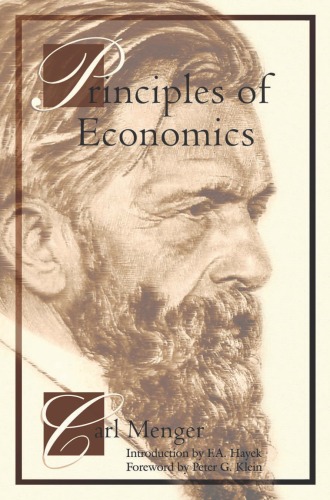

Most ebook files are in PDF format, so you can easily read them using various software such as Foxit Reader or directly on the Google Chrome browser.
Some ebook files are released by publishers in other formats such as .awz, .mobi, .epub, .fb2, etc. You may need to install specific software to read these formats on mobile/PC, such as Calibre.
Please read the tutorial at this link: https://ebookbell.com/faq
We offer FREE conversion to the popular formats you request; however, this may take some time. Therefore, right after payment, please email us, and we will try to provide the service as quickly as possible.
For some exceptional file formats or broken links (if any), please refrain from opening any disputes. Instead, email us first, and we will try to assist within a maximum of 6 hours.
EbookBell Team

5.0
100 reviewsIn the beginning, there was Menger. It was this book that reformulated, and really rescued, economic science. It kicked off the Marginalist Revolution, which corrected theoretical errors of the old classical school. These errors concerned value theory, and they had sown enough confusion to make the dangerous ideology of Marxism seem more plausible than it really was.
Menger set out to elucidate the precise nature of economic value, and root economics firmly in the real-world actions of individual human beings.
For this reason, Carl Menger (1840-1921) was the founder of the Austrian School of economics. It is the book that Mises said turned him into a real economist. What's striking is how nearly a century and a half later, the book still retains its incredible power, both in its prose and its relentless logic.
The Mises Institute's new edition features a new foreword by Peter G. Klein, which summarizes Menger's contribution and places him in the history of ideas. He also explains his continued relevance.
Economics students still say that it is the best introduction to economic logic ever written. The book also deserves the status of a seminal contribution to science in general. Truly, no one can claim to be well read in economics without having mastered Menger's argument.
Menger advances his theory that the marginal utility of goods is the source of their value, not the labor inputs that went into making them. The implication is that the individual mind is the source of economic value, a point which started a revolution away from the flawed classical view of economics.
Menger also covers property, price, time, production, and wealth. On money, for example, it was Menger who so beautifully explained how it originates not in social contract or legislation but within the framework of the market economy.
Table of Contents
Foreword by Peter G. Klein
Introduction by F.A. Hayek
Translator's Preface
Author's Preface
I. The General Theory of the Good
II. Economy and Economic Goods
III. The Theory of Value
IV. The Theory of Exchange
V. The Theory of Price
VI. Use Value and Exchange Value
VII. The Theory of the Commodity
VIII. The Theory of Money
Appendices